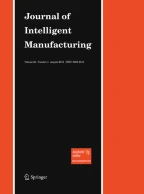Abstract
This study investigates a flow shop group scheduling problem where both sequence-dependent setup time between groups and round-trip transportation time between machines are considered. The objective is to minimize makespan. To solve the problem, we first develop a mixed integer linear programming model and then propose an efficient co-evolutionary discrete differential evolution algorithm (CDDEA). In the CDDEA, several problem-specific heuristic rules are generated to construct initial population. A novel discrete differential evolution mechanism and a cooperative-oriented optimization strategy are proposed to synergistically evolve both the sequence of jobs in each group and the sequence of groups. In addition, two lower bounds are developed to evaluate the solution quality of CDDEA. Extensive computational experiments are carried out. The results show that the proposed CDDEA is effective in solving the studied problem.
Similar content being viewed by others
References
Baker, K. R. (1990). Scheduling groups of jobs in the two-machine flow shop. Mathematical and Computer Modelling, 13(3), 29–36. https://doi.org/10.1016/0895-7177(90)90368-w.
Cheng, H.-M., & Ying, K.-C. (2011). Minimizing makespan in a flow-line manufacturing cell with sequence dependent family setup times. Expert Systems with Applications, 38(12), 15517–15522.
Costa, A., Cappadonna, F. A., & Fichera, S. (2017). A hybrid genetic algorithm for minimizing makespan in a flow-shop sequence-dependent group scheduling problem. Journal of Intelligent Manufacturing, 28(6), 1269–1283.
Costa, A., Cappadonna, F., & Fichera, S. (2020). Minimizing makespan in a flow shop sequence dependent group scheduling problem with blocking constraint. Engineering Applications of Artificial Intelligence, 89, 103413.
Dechampai, D., Tanwanichkul, L., Sethanan, K., & Pitakaso, R. (2017). A differential evolution algorithm for the capacitated VRP with flexibility of mixing pickup and delivery services and the maximum duration of a route in poultry industry. Journal of Intelligent Manufacturing, 28(6), 1357–1376.
Feng, H., Xi, L., Xiao, L., Xia, T., & Pan, E. (2018). Imperfect preventive maintenance optimization for flexible flowshop manufacturing cells considering sequence-dependent group scheduling. Reliability Engineering and System Safety, 176, 218–229.
França, P. M., Gupta, J. N., Mendes, A. S., Moscato, P., & Veltink, K. J. (2005). Evolutionary algorithms for scheduling a flowshop manufacturing cell with sequence dependent family setups. Computers and Industrial Engineering, 48(3), 491–506.
Gnanavel Babu, A., Jerald, J., Noorul Haq, A., Muthu Luxmi, V., & Vigneswaralu, T. (2010). Scheduling of machines and automated guided vehicles in FMS using differential evolution. International Journal of Production Research, 48(16), 4683–4699.
Lin, S.-W., & Ying, K.-C. (2019). Makespan optimization in a no-wait flowline manufacturing cell with sequence-dependent family setup times. Computers and Industrial Engineering, 128, 1–7.
Liou, C. D., & Hsieh, Y. C. (2015). A hybrid algorithm for the multi-stage flow shop group scheduling with sequence-dependent setup and transportation times. International Journal of Production Economics, 170, 258–267.
Liou, C.-D., Hsieh, Y.-C., & Chen, Y.-Y. (2013). A new encoding scheme-based hybrid algorithm for minimising two-machine flow-shop group scheduling problem. International Journal of Systems Science, 44(1), 77–93.
Liu, Y., Yin, M., & Gu, W. (2014). An effective differential evolution algorithm for permutation flow shop scheduling problem. Applied Mathematics and Computation, 248, 143–159.
Logendran, R., Salmasi, N., & Sriskandarajah, C. (2006). Two-machine group scheduling problems in discrete parts manufacturing with sequence-dependent setups. Computers and Operations Research, 33(1), 158–180.
Marimuthu, S., & Sait, A. N. (2013). Performance evaluation of proposed differential evolution and particle swarm optimization algorithms for scheduling m-machine flow shops with lot streaming. Journal of Intelligent Manufacturing, 24(1), 175–191.
Pan, Q.-K. (2016). An effective co-evolutionary artificial bee colony algorithm for steelmaking-continuous casting scheduling. European Journal of Operational Research, 250(3), 702–714.
Qin, H., Zhang, Z.-H., & Bai, D. (2016). Permutation flowshop group scheduling with position-based learning effect. Computers and Industrial Engineering, 92, 1–15.
Ruiz, R., & Maroto, C. (2006). A genetic algorithm for hybrid flowshops with sequence dependent setup times and machine eligibility. European Journal of Operational Research, 169(3), 781–800.
Salmasi, N., Logendran, R., & Skandari, M. R. (2010). Total flow time minimization in a flowshop sequence-dependent group scheduling problem. Computers and Operations Research, 37(1), 199–212.
Schaller, J. E., Gupta, J. N., & Vakharia, A. J. (2000). Scheduling a flowline manufacturing cell with sequence dependent family setup times. European Journal of Operational Research, 125(2), 324–339.
Solimanpur, M., Vrat, P., & Shankar, R. (2004). A heuristic to minimize makespan of cell scheduling problem. International Journal of Production Economics, 88(3), 231–241.
Storn, R., & Price, K. (1997). Differential evolution–a simple and efficient heuristic for global optimization over continuous spaces. Journal of Global Optimization, 11(4), 341–359.
Tasgetiren, M. F., Pan, Q. K., Suganthan, P. N., & Chua, T. J. (2011). A differential evolution algorithm for the no-idle flowshop scheduling problem with total tardiness criterion. International Journal of Production Research, 49(16), 5033–5050.
Vincent, L. W. H., Ponnambalam, S., & Kanagaraj, G. (2014). Differential evolution variants to schedule flexible assembly lines. Journal of Intelligent Manufacturing, 25(4), 739–753.
Wang, B., Huang, K., & Li, T. (2018). Permutation flowshop scheduling with time lag constraints and makespan criterion. Computers and Industrial Engineering, 120, 1–14.
Yoshida, T., & Hitomi, K. (1979). Optimal two-stage production scheduling with setup times separated. A I I E Transactions, 11(3), 261–263. https://doi.org/10.1080/05695557908974469.
Zandieh, M., & Karimi, N. (2011). An adaptive multi-population genetic algorithm to solve the multi-objective group scheduling problem in hybrid flexible flowshop with sequence-dependent setup times. Journal of Intelligent Manufacturing, 22(6), 979–989.
Zhou, S., Li, X., Du, N., Pang, Y., & Chen, H. (2018). A multi-objective differential evolution algorithm for parallel batch processing machine scheduling considering electricity consumption cost. Computers and Operations Research, 96, 55–68.
Acknowledgements
This research is supported by the National Natural Science Foundation of China under [Grant Number 71701016, 71471015]; and the Beijing Natural Science Foundation under [Grant Number 9174038].
Author information
Authors and Affiliations
Corresponding author
Additional information
Publisher's Note
Springer Nature remains neutral with regard to jurisdictional claims in published maps and institutional affiliations.
Rights and permissions
About this article
Cite this article
Yuan, S., Li, T. & Wang, B. A discrete differential evolution algorithm for flow shop group scheduling problem with sequence-dependent setup and transportation times. J Intell Manuf 32, 427–439 (2021). https://doi.org/10.1007/s10845-020-01580-3
Received:
Accepted:
Published:
Issue Date:
DOI: https://doi.org/10.1007/s10845-020-01580-3
